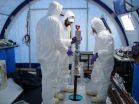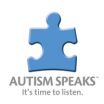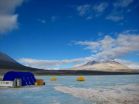(Press-News.org) Several drugs companies have ineffectively tried to produce antibodies that bind to the IGF-1 receptor on the cell surface, which has a critical part to play in the development of cancer. Scientists at Karolinska Institutet in Sweden have now ascertained how these antibodies work, and can explain why only some cancer patients are helped by IGF-1 blockers during clinical tests. The researchers also present a means by which drugs of this kind could help more cancer patients.
Every cell contains thousands of tiny receptors that help it communicate with other cells. These receptors are involved in countless physiological processes, such as taste and smell perception and heart rate. A couple of dozen of these receptors form their own family – the kinase receptors (RTKs), which are implicated in cancer. The so-called IGF-1 receptor is particularly important for cancer cell survival, and as soon as this receptor encounters the right hormone (type 1 insulin-like growth factor, or IGF-1) into the cancer cell open a number of communication channels, helping it to grow, rapidly divide and protect itself against treatment.
Blocking this receptor with an antibody that binds to it and makes it inaccessible to IGF-1 has long been regarded as the key to a potential cancer therapy, the idea being that it will eventually lead to the death of the tumour cell. Several drugs companies have therefore been developing such antibodies in order to treat the most aggressive forms of cancer, and after some promising laboratory tests, have tested a number of these preparations on patients. However, the drugs have generally given disappointing results and helped only a small minority of patients (including children with Ewing's sarcoma), leading some companies to discontinue clinical trials focusing on the IGF-1 receptor.
The Karolinska Institutet team has now systematically analysed the different IGF-1-related triggered communication channels within a cancer cell. Their results show that the original idea is correct and that such antibody treatment does actually stop the channels from opening, with one very important exception: the MEK channel was actually powerfully stimulated by the treatment – the antibodies being as effective in this as the hormone itself – and actively helped the cancer cells to survive.
"This gives us a credible explanation why the antibody trials for the IGF-1 receptor weren't as effective as had been hoped," says principal investigator Dr Leonard Girnita, docent of pathology at Karolinska Institutet's Department of Oncology-Pathology. "So it's too early to give up on the idea of treating cancer like this – it's still a very good way of attacking the cancer, provided we can close this final communication channel. If we can do this, antibodies for the IGF-1 receptor are likely to form an effective treatment not only for Ewing's sarcoma in children but many other cancers as well."
Drugs that are used to close this channel in other forms of treatments are already available. The researchers believe that a combination therapy using such MEK inhibitors with IGF-1 blockers can be the key to releasing the potential of this therapy model.
"We've seen in the laboratory that cell lines treated in this way no longer manage to divide," says Dr Girnita. "When they die of old age there is no regrowth, so we've seen in the laboratory environment how cancer cells die out of their own accord."
INFORMATION:
The study was financed with grants from the Swedish Cancer Society, the Swedish Research Council, the Children's Cancer Foundation, the Crown Princess Margareta Fund for the Visually Impaired, the Welander/Finsen foundations, the King Gustaf V Jubilee Fund, Vinnova (The Swedish governmental agency for innovation systems), the Cancer Research Funds of Radiumhemmet, Stockholm County Council and Karolinska Institutet.
Publication: "β-arrestin biased agonism as the central mechanism of action for the IGF-1R targeting antibodies in Ewing's sarcoma", Huiyuan Zheng, Hongchang Shen, Iulian Oprea, Claire Worrall, Radu Stefanescu, Ada Girnita and Leonard Girnita, Proceedings of the National Academy of Sciences (PNAS) online Monday 26 November 2012.
For further information about the study, please contact:
Leonard Girnita, MD, PhD
Associate Professor of Pathology, Group leader
Department of Oncology-Pathology – Karolinska Institutet
Tel: +46 (0)8-517 766 11 or + 46(0)73-6793205
Email: leonard.girnita@ki.se
Website: http://ki.se/ki/jsp/polopoly.jsp?d=24301&l=en
Contact the Press Office and download a photo: ki.se/pressroom
Karolinska Institutet is one of the world's leading medical universities. It accounts for over 40 per cent of the medical academic research conducted in Sweden and offers the country's broadest range of education in medicine and health sciences. Since 1901 the Nobel Assembly at Karolinska Institutet has selected the Nobel laureates in Physiology or Medicine. More on ki.se/english
END
RENO – This week a pioneering study published in the Proceedings of the National Academy of Sciences (PNAS) and co-authored by Dr. Alison Murray and Dr. Christian Fritsen of Nevada's Desert Research Institute (DRI) reveals, for the first time, a viable community of bacteria that survives and ekes out a living in a dark, salty and subfreezing environment beneath nearly 20 meters of ice in one of Antarctica's most isolated lakes.
Lake Vida, the largest of several unique lakes found in the McMurdo Dry Valleys, contains no oxygen, is mostly frozen and possesses the highest ...
SALT LAKE CITY— Discovery of a new drug with high potential to treat Ewing sarcoma, an often deadly cancer of children and young adults, and the previously unknown mechanism behind it, come hand-in-hand in a new study by researchers from Huntsman Cancer Institute (HCI) at the University of Utah. The report appears in today's online issue of the journal Oncogene.
"Ewing sarcoma is almost always caused by a cancer-causing protein called EWS/FLI," said Stephen Lessnick, M.D., Ph.D., director of HCI's Center for Children's Cancer Research, professor in the Department of ...
Biologists at UC San Diego have demonstrated for the first time that marine algae can be just as capable as fresh water algae in producing biofuels.
The scientists genetically engineered marine algae to produce five different kinds of industrially important enzymes and say the same process they used could be employed to enhance the yield of petroleum-like compounds from these salt water algae. Their achievement is detailed in a paper published online in the current issue of the scientific journal Algal Research.
The ability to genetically transform marine algae into ...
This press release is available in Spanish.
Student engagement is not independent of the type of school attended.Nor is it independent of the organisational development of the school.The school's organisational style affects the work of its teaching staff, which, in turn, has repercussions on the performance and engagement of their students.As IkerRos, the UPV/EHU researcher, has been able to verify in his PhD thesis, these factors vary when comparing public schools, subsidised schools and co-operative schools, the latter being the ones that fare best.
"The study of ...
(NEW YORK, N.Y., November 26, 2012) – Autism Speaks Chief Science Officer Geraldine Dawson, Ph.D. describes how the dramatic progress in autism research has paralleled increased recognition of autism's prevalence and financial impact in the December issue of the Archives of General Psychiatry published on line today. "This issue of the journal features three articles on autism," she writes in her editorial. "A decade ago, the journal published about the same number of autism articles per year."
Dr. Dawson also notes that, while the funding for autism research has dramatically ...
An area of the brain called the orbitofrontal cortex is responsible for decisions made on the spur of the moment, but not those made based on prior experience or habit, according to a new basic science study from substance abuse researchers at the University of Maryland School of Medicine and the National Institute on Drug Abuse (NIDA). Scientists had previously believed that the area of the brain was responsible for both types of behavior and decision-making. The distinction is critical to understanding the neurobiology of decision-making, particularly with regard to substance ...
SAN DIEGO, Calif. (November 26, 2012) The Algae Biomass Organization, the trade association for the U.S. algae industry today hailed the findings of a University of California at San Diego study that concludes, for the first time, that marine (saltwater) algae can be just as capable as freshwater algae in producing biofuels. The research is documented in a peer-reviewed paper published online in the current issue of the scientific journal Algal Research.
"What this means is that you can use ocean water to grow the algae that will be used to produce biofuels. And once ...
EAST LANSING, Mich. — Where there's water there's life – even in brine beneath 60 feet of Antarctic ice, in permanent darkness and subzero temperatures.
While Lake Vida, located in the northernmost of the McMurdo Dry Valleys of East Antarctica, will never be a vacation destination, it is home to some newly discovered hearty microbes. In the current issue of the Proceedings of the National Academy of Sciences, Nathaniel Ostrom, Michigan State University zoologist, has co-authored "Microbial Life at -13ºC in the Brine of an Ice-Sealed Antarctic Lake."
Ostrom was part ...
The wild and dramatic cascade of ice into the ocean from Alaska's Columbia Glacier, an iconic glacier featured in the documentary "Chasing Ice" and one of the fastest moving glaciers in the world, will cease around 2020, according to a study by the University of Colorado Boulder.
A computer model predicts the retreat of the Columbia Glacier will stop when the glacier reaches a new stable position -- roughly 15 miles upstream from the stable position it occupied prior to the 1980s. The team, headed by lead author William Colgan of the CU-Boulder headquartered Cooperative ...
SEATTLE—After gastric bypass surgery, diabetes goes away for some people—often even before they lose much weight. So does that mean gastric surgery "cures" diabetes? Not necessarily, according to the largest community-based study of long-term diabetes outcomes after bariatric surgery. For most people in the study, e-published in advance of print in Obesity Surgery, diabetes either never remitted after gastric surgery or relapsed within five years.
Among the two thirds of the study's patients whose diabetes at first went away, more than a third re-developed diabetes again ...




